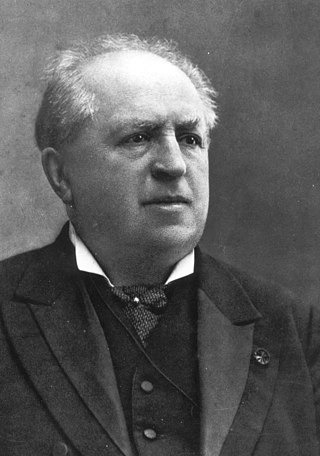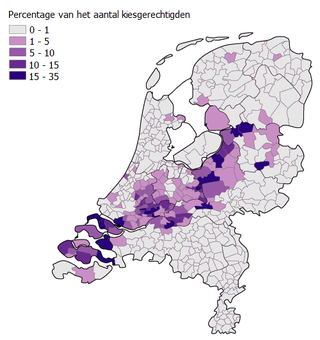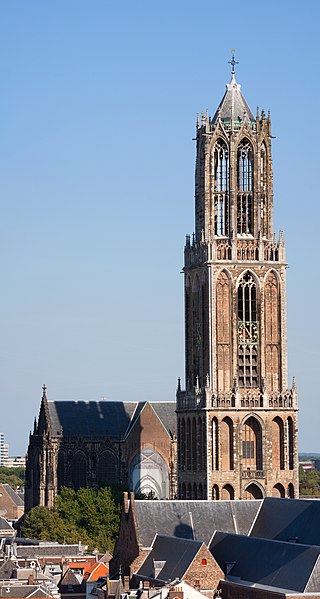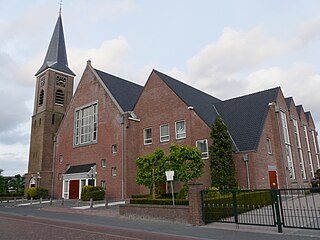The Christian Union is a Christian democratic political party in the Netherlands. The CU is a centrist party, maintaining more progressive stances on economic, immigration and environmental issues while holding more socially conservative positions on issues such as abortion and euthanasia. The party describes itself as "social Christian".

The Reformed Political Party is a conservative Reformed Christian political party in the Netherlands. The SGP is the oldest political party in the Netherlands existing in its present form, and has been in opposition for its entire existence. Since 1925, it has won between 1.5% and 2.5% of the votes in general elections. Owing to its orthodox political ideals and its traditional role in the opposition, the party is considered a testimonial party.

The Anti-Revolutionary Party was a Protestant conservative and Christian democratic political party in the Netherlands. The party was founded in 1879 by Abraham Kuyper, a neo-Calvinist theologian and minister who served as Prime Minister between 1901 and 1905. In 1980 the party merged with the Catholic People's Party (KVP) and the Christian Historical Union (CHU) to form the Christian Democratic Appeal (CDA).

Abraham Kuyper was the Prime Minister of the Netherlands between 1901 and 1905, an influential neo-Calvinist pastor and a journalist. He established the Reformed Churches in the Netherlands, which upon its foundation became the second largest Reformed denomination in the country behind the state-supported Dutch Reformed Church.
The Dutch Reformed Church was the largest Christian denomination in the Netherlands from the onset of the Protestant Reformation in the 16th century until 1930. It was the traditional denomination of the Dutch royal family and the foremost Protestant denomination until 2004, the year it helped found and merged into the Protestant Church in the Netherlands. It was the larger of the two major Reformed denominations, after the Reformed Churches in the Netherlands was founded in 1892. It spread to the United States, South Africa, Indonesia, Sri Lanka, Brazil, and various other world regions through Dutch colonization. Allegiance to the Dutch Reformed Church was a common feature among Dutch immigrant communities around the world and became a crucial part of Afrikaner nationalism in South Africa.

The Christian Historical Union was a Protestant Christian democratic political party in the Netherlands. The CHU is one of the predecessors of the Christian Democratic Appeal (CDA), into which it merged in September 1980.

The Reformatory Political Federation was a minor Protestant Christian political party in the Netherlands.

The Reformed Churches in the Netherlands was the second largest Protestant church in the Netherlands and one of the two major Calvinist denominations along with the Dutch Reformed Church since 1892 until being merged into the Protestant Church in the Netherlands (PKN) in 2004. The PKN is the continuation of the Dutch Reformed Church, the Reformed Churches in the Netherlands and the Evangelical Lutheran Church in the Kingdom of the Netherlands.

The Roman Catholic State Party was a Catholic Christian democratic political party in the Netherlands. The party was founded in 1926 as a continuation of the General League of Roman Catholic Electoral Associations. During its entire existence, the party was in government. In 1945 the party became the Catholic People's Party (KVP).

The General League of Roman Catholic Electoral Associations, informally called the General League, was a Catholic political party in the Netherlands. It existed from 1904 to 1926, when it was succeeded by the Roman Catholic State Party. It is one of the ancestors of today's Christian Democratic Appeal.

The Bible Belt is a strip of land in the Netherlands with the highest concentration of conservative orthodox Reformed Protestants in the country. Although the term is of recent origin the Dutch Bible Belt has existed for many generations.

The Social Democratic Workers' Party was a Dutch socialist political party existing from 1894 to 1946. Originating from a split in the prior Social Democratic League, the party was a predecessor of the current social democratic Labour Party (Netherlands).
The Liberal State Party, "the Freedom League", was a conservative liberal political party in the Netherlands from 1921 to 1948. It is historically linked to the People's Party for Freedom and Democracy (VVD), a major Dutch political party.

Religion in the Netherlands was dominated by Christianity between the 10th and 20th centuries. In the late 19th century, roughly 60% of the population was Calvinist and 35% was Catholic. Also, until the Holocaust, there was a noticeable Jewish minority. Since world war II, there has been a significant decline in Catholic and especially Protestant Christianity, with Protestantism declining to such a degree that Catholicism became the foremost form of the Christian religion. The majority of the Dutch population is secular. Relatively sizable Muslim and Hindu minorities also exist.

The Free Anti Revolutionary Party was a Dutch conservative Reformed political party, which existed from 1898 to 1903.

The League of electoral associations on Christian Historical foundation in the province of Friesland, informally called the Frisian League is a conservative Reformed political party in the Netherlands. The Frisian League is historically linked to the Christian Democratic Appeal, which is currently one of the major parties of the Netherlands.

This article gives an overview of Christian democracy in the Netherlands, which is also called confessionalism, including political Catholicism and Protestantism.

The Restored Reformed Church is a Calvinist denomination in the Netherlands. It was founded in 2004, from congregations which made up the orthodox-reformed wing of the Dutch Reformed Church; they had previously been part of groups named Het Gekrookte Riet and the still existing Gereformeerde Bond within the Dutch Reformed Church. The Church has grown steadily since its founding.

The Reformed Political League was an orthodox Protestant political party in the Netherlands. The GPV is one of the predecessors of the Christian Union. The party was a testimonial party.
The Reformed Association in the Protestant Church in the Netherlands is a confessional orthodox Calvinist group and movement within the Protestant Church in the Netherlands.














